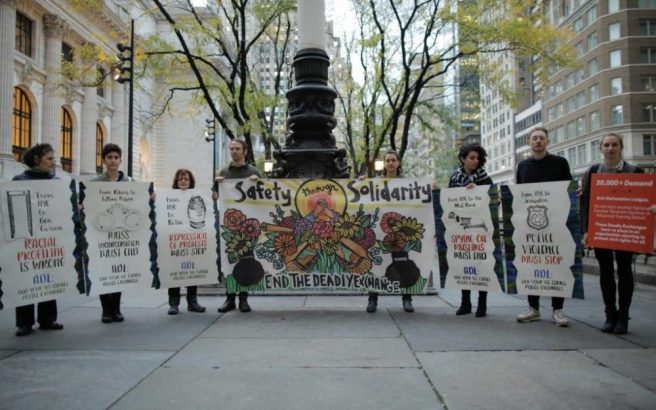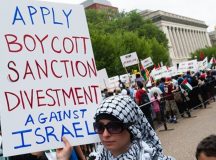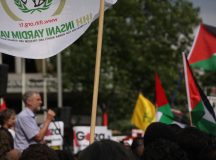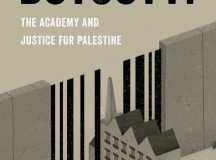The Deadly Exchange campaign falsely blames Israel and its Jewish American supporters for fueling discriminatory policing practices against minority communities in America and militarising the approach to crime and public protests, argues Miriam F. Elman of Syracuse Univrsity. At its root, the campaign traffics in antisemitic tropes about Jewish power in order to accuse Israel and Jewish American organisations of conspiring against American people of colour. The campaign racialises the Middle East conflict by setting up Israel and its Jewish American supporters as enemies that directly threaten American (and Palestinian) ‘black and brown bodies.’ Elman suggests the campaign has no empirical basis, makes false claims, is designed to distort and demonise and should be opposed. Those rightly concerned by aspects of US policing should look to the US and stop encouraging a new blood libel about the Jews.
Last February more than two dozen offensive posters were discovered plastered to the glass windows of the Granoff Family Hillel Center at Tufts University in Massachusetts. (Hillel: The Foundation for Jewish Campus Life is a Jewish campus organisation represented at over 550 US colleges and universities.) The flyers reproduced 1960s anti-imperialist cartoons of pigs dressed up in military fatigues and police uniforms. But they also gave this Black Panther Party propaganda a new twist. Included on the posters was an all-caps text that called for a ‘Free Palestine’ and to ‘destroy Israeli apartheid forces and Amerikkkan pigs which fund it.’
Tufts President Anthony Monaco issued swift condemnations of the flyers in two separate campus-wide emailed statements. But the initial statement didn’t reference the singling out of Hillel and only characterised the posters in general terms (as an ‘act of intolerance’) and not as antisemitic forms of anti-Israel expression. Faced with mounting criticism, on February 14 the administration released a second statement explicitly labeling the posters as antisemitic and informing the campus that an investigation was underway.
No one yet knows who is responsible for the disgusting posters. But it can’t be much of a coincidence that they appeared at the same time that a repugnant campaign known as Deadly Exchange, which links Israel to white supremacy and alleged US police brutality, is well underway nation-wide. At Tufts, where BDS (boycott, divestment, and sanctions) activists are busy promoting it, Jews have been feeling distraught and anxious.
And that was before the posters.
‘DEADLY EXCHANGE’: A VICIOUS CAMPAIGN TARGETTING ISRAEL AND AMERICAN ZIONISTS
Deadly Exchange was launched several years ago by the not-so-Jewish and not-very-peaceful California-based Jewish Voice for Peace (JVP), a group that refers to itself as the ‘Jewish wing of the Palestinian solidarity movement’. JVP spends much of its time deploying Jewish symbols and traditions to celebrate terrorists, attack Israel, and give a kosher stamp of approval to its non-Jewish BDS allies. Now, via Deadly Exchange, it’s itself peddling in antisemitic canards and engaging in antisemitic actions.
Heavily promoted today by a host of US-based anti-Israel organisations, the Deadly Exchange campaign falsely blames Israel and its Jewish American supporters for fueling discriminatory policing practices against minority communities in America and militarising the approach to crime and public protests. At its root, the campaign traffics in tropes about Jewish power in order to accuse Israel and Jewish American organisations of conspiring to encourage police brutality and increased deportation and imprisonment rates of American people of colour. It follows that if you care about social justice issues like policing problems and prison reform or the Black Lives Matter movement then you must also revile Israel and detest its supporters, who now stand accused of complicity in the suffering of American blacks, Latinos, and Native Americans.
The ‘deadly exchange’ supposedly happens because groups like the Anti-Defamation League (ADL) – America’s leading Jewish-founded civil rights organisation that combats antisemitism, prejudice, and hate crimes – are funding American-Israeli police exchange programmes where US law-enforcement officials allegedly learn ‘worst practices.’
Basically, Deadly Exchange exploits concerns over US racial tensions to accuse Jewish American groups like the ADL of sponsoring racist and militarised policing in America via longstanding counter-terror training seminars in Israel. It essentially racialises the Middle East conflict by setting up Israel and its Jewish American supporters as enemies that directly threaten American (and Palestinian) ‘black and brown bodies.’
The Deadly Exchange campaign is the most wildly obnoxious propaganda that the radical and fringe JVP has yet concocted to demonise Israel and demoralise its American supporters. Condemned by the ADL and slammed even by stalwart critics of Israel, it has nonetheless been gaining traction on America’s universities and in local government. City councils are being aggressively lobbied by activists promoting the campaign and at least one municipality – Durham, North Carolina – has now aligned its policing policy with the Deadly Exchange agenda.
Multiple US-based anti-Israel organisations, including the US Campaign for Palestinian Rights, Adalah-NY, International Solidarity Movement-Palestine, and the American Friends Service Committee have been publicising the Deadly Exchange campaign to their members via their websites, listservs, and social media feeds. In several cities in America’s northeast, groups have formed to push the campaign at the municipal level. The ‘Occupation Free DC’ coalition, for example, is calling on the D.C. Metropolitan Police Department to end its participation in counter-terrorism trainings in Israel. Another Deadly Exchange coalition is active in Pittsburgh, Pennsylvania where the deadliest attack on Jews in US history happened last October.
Prominent public figures have begun to endorse the campaign’s key talking points too. Women’s March leader Tamika Mallory, who launched an attack on the ADL last year after it was selected among several civil rights groups to provide diversity training for Starbucks employees, alluded to Deadly Exchange when she complained about the ADL ‘constantly attacking black and brown people.’
Then, last spring, at an ‘emergency protest’ organised by the Atlanta, Georgia chapter of JVP, Black Lives Matter-Atlanta, and the Council on American-Islamic Relations (CAIR)-Atlanta to ‘denounce Israel’ for the violence at the border with Gaza, the executive director of CAIR-Georgia Edward Ahmed Mitchell reprimanded ‘our Atlanta police officers’ for ‘traveling to Israel, training in urban policing and bringing it back here … American police officers must serve and protect, not occupy and control.’
And speaking on the ‘Breakfast Club’ radio programme in December, Marc Lamont Hill, the recently fired CNN political commentator and tenured Temple University professor, explained why he thought it appropriate to focus on the Israeli-Palestinian conflict when addressing the struggles that racial minorities face in America: ‘The New York City Police, they’re killing us, but they’re being trained by Israeli security forces. They’re being trained – New York City police and in other cities as well. So here’s a connection between the two. I can’t stop one without the other, there’s a relationship…Remember I ain’t talking about Jewish people, I’m talking about the Israeli state.’
Meanwhile, at Tufts, Deadly Exchange has been galvanising anti-Israel activists for over a year. Several student groups, including Tufts United for Immigrant Justice, have organised a series of events to raise awareness of US-Israel police exchanges and to call for senior officials in the Tufts University Police Department to cease traveling to Israel for training. An event to discuss the ‘US-Israeli Police Exchange Program & Tufts Involvement’ was hosted by the university’s chapter of the national organisation Students for Justice in Palestine in January.
Articles plugging Deadly Exchange have also featured in The Tufts Daily student newspaper (see here and here). One endorsement was published on February 14, 2018 – almost a year to the day that posters with incendiary cartoons of pigs holding guns defaced Tufts University’s Hillel building.
ORIGINS OF AN ANTISEMITIC CAMPAIGN
‘Deadly Exchange: Ending US-Israel Police Exchanges, Reclaiming Safety’ positions JVP at the forefront of the effort to stoke hatred of Israel and Zionist Jews through intersectionality, which BDS has morphed into a theory of generalised victimhood. According to the theory, Israel is a global oppressor of American minority communities and the source of the problems that these groups face. Once you’re wedded to this BDS view of intersectionality, it’s not a great leap to begin castigating Israel’s supporters in the US as the driving force behind a white police power structure harming non-white Americans.
Specifically, Deadly Exchange accuses five organisations in mainstream Jewish American life – the ADL, the American Israel Public Affairs Committee (AIPAC), The Jewish Institute for National Security Affairs (JINSA), the American Jewish Committee (AJC), and Taglit-Birthright Israel – of deliberately conspiring to harm the innocent. According to JVP, these organisations are complicit in fostering ‘deadly exchanges’ where American and Israeli security officials and experts ‘trade tips’ that ‘extend discriminatory and repressive policing in both countries’ including fatal police shootings of African Americans and the ‘extrajudicial killings’ by Israeli police of Palestinians in the West Bank.
Racial issues in the US unrelated to Israel have long been hijacked by BDS activists keen on turning them against Israel and for years prominent progressive activists have been blaming Israel for police shootings of African Americans, well before JVP concocted Deadly Exchange. JVP’s innovation was to package the patently false ‘Ferguson to Gaza’ meme, popularised by some Black Lives Matter groups, into a full-blown campaign that turns American Zionists into co-conspirators with Israel in some nefarious mission to hurt their fellow Americans. That is, Deadly Exchange scapegoats Jews and aims to exploit preexisting domestic racial tensions to stir up hatred of Israel by blaming its American Jewish supporters – all in the service of building pro-BDS intersectional coalitions.
The allegations that form the crux of Deadly Exchange were first introduced as a supplement to JVP’s 2017 Passover Haggadah. Then, on June 4, 2017 JVP activists wearing red T-shirts with Deadly Exchange emblazoned on them and unfurling campaign banners deliberately targeted an LGBT Jewish Zionist group marching in New York City’s Celebrate Israel Parade. One of the signs held aloft said ‘Israel Out of Palestine | Cops Out of NYC’, offering candid insight into what the campaign would be about. In its own documentation of the attack JVP bragged about a hundred of their activists descending on the queer youth, tearing down their Pride banner and forcing an altercation with the police. A short post praising the disruption and a video about it was eventually featured on the website created for Deadly Exchange.
Since 2017, JVP has been promoting Deadly Exchange with a wide array of campaign materials, including slickly designed videos, online petitions, multi-media reports, and Google slide presentations available for community organisers. The immediate goal is to shut down the training programmes between US police, ICE, and FBI agents with their counterparts in Israel. But consistent with JVP’s various propaganda campaigns, the main purpose is to weaken Israel’s reputation and tarnish Zionism. Deadly Exchange uses false claims against police exchanges with Israel not as a means of improving US police performance or police services to minority communities but as a way to advance the overall objectives of BDS.
Concerns over policing in the US are legitimate. It’s reasonable to be distressed about ongoing problems, including racial profiling and police harassment of minorities, coercive police actions and officer-caused homicides, and the underrepresentation of minorities in US law enforcement agencies as well as discriminatory hiring practices in some police agencies. Deadly Exchange, however, is not a valid response to these concerns. The reality is that Israel today has made significant advances in community policing. It also boasts a highly diverse police force with ongoing recruitment campaigns of Arabs, women, and other minorities. The upshot is that delegations of high-level US police officials spending time with their Israeli counterparts won’t solve all of America’s modern policing challenges—but it certainly can’t hurt.
VICTORIES AND LOSSES FOR DEADLY EXCHANGE
Deadly Exchange has scored recent wins in Northampton, Massachusetts and in Vermont, where last year police officials pulled out of a planned ADL-sponsored training seminar in Israel, and in Durham, North Carolina, which now has the bad fortune of being the first city in America to impose a total ban on law-enforcement trainings with the Jewish state.
In each of these cases, local JVP activists were able to forge alliances with far-left groups and exploit city-level decision making processes and procedures to their advantage. Their intense lobbying campaigns ran roughshod over the objections of the police and the positions of the majority of Jews living in these states, including local rabbis. Indeed, one of the most interesting features of the campaigns in these cities was how successful local JVP activists were in presenting themselves as legitimate representatives of the Jewish community.
In Durham, the City Council’s discriminatory statement now bars all types of police exchanges with Israel, while only ‘military-style training’ with other foreign countries is opposed. JVP managed to convince the City Council that fighting racism in Durham required a policy statement to shutter any and all police training programmes in Israel – even though Durham’s law enforcement officials hadn’t participated in any counterterror trainings there for over a decade.
A single one-week trip that former Durham police chief Jose Lopez took to Israel involved sessions on managing mass casualty situations; in a statement to the City Council, Lopez noted that ‘none of the training had anything to do with militarisation’. The City Council statement also selectively quoted from a letter that Durham Police Chief Cerelyn ‘C.J.’ Davis had submitted on the topic of police exchanges with Israel. It implies that Davis has a negative view of trainings because she hasn’t initiated any and doesn’t plan to do so in the future. In fact, her letter included a positive depiction of her own experiences participating in one such US-Israel law enforcement programme.
As I described in an article for the website Legal Insurrection, a set of features unique to Durham made it particularly ripe for this exploitation by JVP, including a history of racial tensions and recent flare-ups (e.g., the tearing down of a Confederate Statue in August 2017, which generated widespread controversy); a strong progressive identity, along with the presence of numerous well-established far-left groups that could serve as JVP allies; city council members who had conflicts of interest; the leadership of the local Jewish Federation which, while not in support of the JVP campaign, failed to visibly stand up in opposition to it early on; and a small local pro-Israel group with insufficient funds to mount a successful counter to JVP’s well-oiled and professional grassroots activism.
But the fact that JVP activists held leadership roles in Durham’s synagogues and in the Jewish Federation of Durham-Chapel Hill was also significant as it worked to increase their clout. I highlighted in my article that JVP could lead the BDS campaign at the City Council precisely because its Durham activists weren’t perceived as outsiders in the local Jewish community. This allowed them to better make the case that they were speaking from an acceptable perspective within the Jewish ‘big tent.’
These days JVP is actively trying to capitalise on its success in Durham, but with mixed results. A number of municipalities have stood their ground, while others have succumbed to lobbying pressures. Last December, public officials in Vermont and Northampton, Mass. decided to nix police participation in the ADL’s New England Leadership Seminar in Israel: Resiliency and Counter-Terrorism – the first time in the history of the programme that a law enforcement mission withdrew after having initially signed up to attend. In both cases, the decision was made after politicians were contacted by a coalition of residents mobilised quickly by JVP activists.
Once JVP learned of the cancellations in Vermont and Northampton it then went into overdrive to convince other police departments that had registered for the ADL’s New England junket to back out of the seminar. But in Boston, Mayor Marty Walsh refused to cancel the scheduled trip. Perhaps it was because Police Commissioner William Gross had previously attended a training and so the protestations of Boston JVP organiser Elsa Auerbach, namely that the ADL-sponsored police programme in Israel ‘doesn’t serve the interests of a safe Boston’, fell on deaf ears. It’s also possible that the Mayor and officials in Boston’s PD were less likely to be swayed by Deadly Exchange lobbying because of their prior run-ins with JVP, and its sister group If Not Now, whose activists have had a knack for getting arrested during anti-Israel protests in Boston.
In Rhode Island, Deadly Exchange also struck out. When the Rhode Island Coalition for Israel (RICI) caught wind of JVP’s action alerts and organised-letter writing campaign, it quickly put out its own mass mailing, urging its members to thank the Governor and police chief for ‘resisting the devious, politically-motivated pressure campaign’ of the ‘malevolent radical leftist group Jewish Voice for Peace (JVP).’ So JVP’s sophisticated campaign of disinformation can be defeated when local pro-Israel groups respond quickly, providing public officials with accurate information about life-saving US-Israel police exchanges. It’s an important lesson for other US municipalities.
DEBUNKING DEADLY EXCHANGE
In the years since the September 11 attacks, scholarship on the erosion of civil liberties as a consequence of the US-initiated global war on terror (GWOT) has become a cottage industry. Among these critiques of the military-industrial complex surrounding US counter-terror efforts, there’s also a fair amount of research focused specifically on militarised state violence and local policing problems that the GWOT has facilitated (one reputable study on the topic is Nikhil Pal Singh’s Race and America’s Long War).
It’s certainly possible to question this body of work, which in my view tends to underplay threats to homeland security, is overly skeptical of public-private security partnerships, and generally treats US law enforcement agencies with an unwarranted degree of suspicion and hostility. But it’s also a legitimate research agenda. Where Deadly Exchange goes off the rails isn’t by flagging these complex problems but in attributing them to US-Israel police exchanges – as if an American police chief’s participation in a week-long counter-terror seminar in Israel determines his or her department’s policing practices and procurement policies or drives the behaviour of a cop on the beat.
The campaign’s causal argument goes like this: US-Israel police trainings enable the IDF to share its ‘worst practices’ like ‘torture, surveillance and spying which is all brought to bear against Palestinians.’ Then, having completed the training sessions, back home US law enforcement officials willingly adopt these practices to use against American ‘people of colour.’ The reality is that the history of militarised policing in the US is multifaceted and ‘largely homegrown.’ That is, it has nothing to do with Israel.
Moreover, to date only a small fraction of US police officers have visited Israel for trainings – not the ‘thousands’ that JVP claims to have participated. The high-level US law enforcement officials who go on these programmes focus on counter-terrorism and attacks ranging from bombings to active shooter situations. The delegations receive briefings from Israeli law enforcement officials, not the IDF, and not about policing with regard to other kinds of crime. The purpose of the ADL’s National Counter-Terrorism Seminar (NCTS), for example, is to ‘deter and disrupt terror attacks and strengthen community resilience.’
So, there’s simply no empirical basis to the notion that an American cop involved in a police shooting was ‘trained’ in Israel by the IDF, and that this training contributed to an unjustified shooting.
Deadly Exchange doesn’t rest on thoughtful reasoning subject to factual evidence. The campaign asserts that Israel’s methods and technologies to proactively monitor crime and terror threats and ensure public safety are actually developed and used to oppress Palestinians. So, if US cities, municipalities or campuses purchase and implement these Israeli techniques and systems then they’ll also be oppressing local minorities. But consider that the planet’s most extensive camera monitoring system is not in Israel but in the City of London, where just about everyone gets filmed. Many of London’s CCTV cameras are operated by British government bodies, but Israeli technology is relied on (as with the Israeli manufactured ‘drone dome’ system and live mobile CCTV systems recently deployed at Gatwick airport). Are these technologies oppressive to minorities, as the promoters of Deadly Exchange insist, or are they effective in ensuring public safety and the prevention and prosecution of crime?
One of the best takedowns of Deadly Exchange remains Berlin-based lawyer Andrew Mark Bennett’s blog published when the campaign was initially rolled out. Bennett rightly notes that the evidence-free insinuations of the materials tend to ‘trap the casual viewer.’
In a detailed review of the campaign’s initial promotional video, for example, he points to a frame depicting the US supplying Israel with tear gas, a supposedly damning fact. Israel’s use of tear gas against violent rioters can be defended or criticised. But, as Bennett remarks, Deadly Exchange wants viewers to do more than that. It demands that Israel be held responsible for the tear gas used in Ferguson, Missouri ‘which of course Israel had nothing to do with.’
Other such supposed linkages between what happens in the occupied territories and in American cities similarly defy logic.
Take the ludicrous accusation that the ADL is complicit in the police shooting of Michael Brown, an incident that sparked the Ferguson protests and galvanised the Black Lives Matter movement. According to the Deadly Exchange video, it’s of considerable consequence that former Ferguson police chief Timothy Fitch attended a week-long ADL-sponsored counterterror training programme in Israel in 2011. Yet Fitch retired three years later in January 2014 – six months before the killing of Brown. Bennett asks the logical question: ‘Does any intelligent person seriously think there is a significant causal connection there?’
CONCLUSION
Despite pushback from a number of professional police associations and chief law enforcement officers and a few defeats along the way, there are no signs yet that the vicious Deadly Exchange campaign will peter out any time soon.
Consider that just a few weeks ago at an elite US university an African American senator casually said at a student government meeting that ‘the IDF trains the police departments in America to kill black people.’ She further calmly informed her Jewish peers that the liberation of American blacks and Palestinians are ‘intertwined’ because Zionists fund the ‘prison industrial complex’, ‘prison militarisation’, and ‘modern-day slavery.’
That such toxic lies are being voiced in such a cavalier manner, and tolerated and listened to, is a troubling trend for America’s Jews.
Miriam F. Elman is an Associate Professor of Political Science at the Maxwell School of Citizenship & Public Affairs, Syracuse University. She is currently serving as Executive Director of the Academic Engagement Network, a non-profit organisation that combats the delegitimisation of Israel and campus antisemitism. Elman frequently writes on contemporary left-wing antisemitism in the US. Last year she was listed by the Algemeiner among the top 100 people worldwide who are positively influencing Jewish life.







































Can libel laws be applied to claims that the ADL and related private American organizations are responsible for police violence against American minorities?